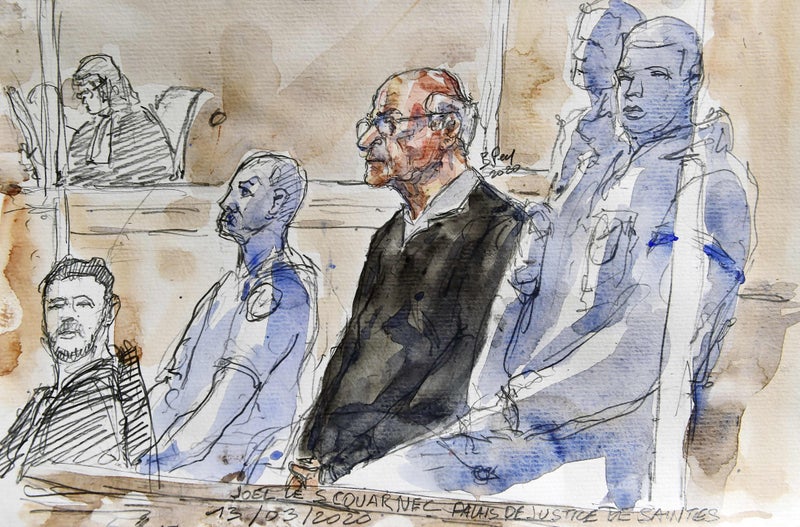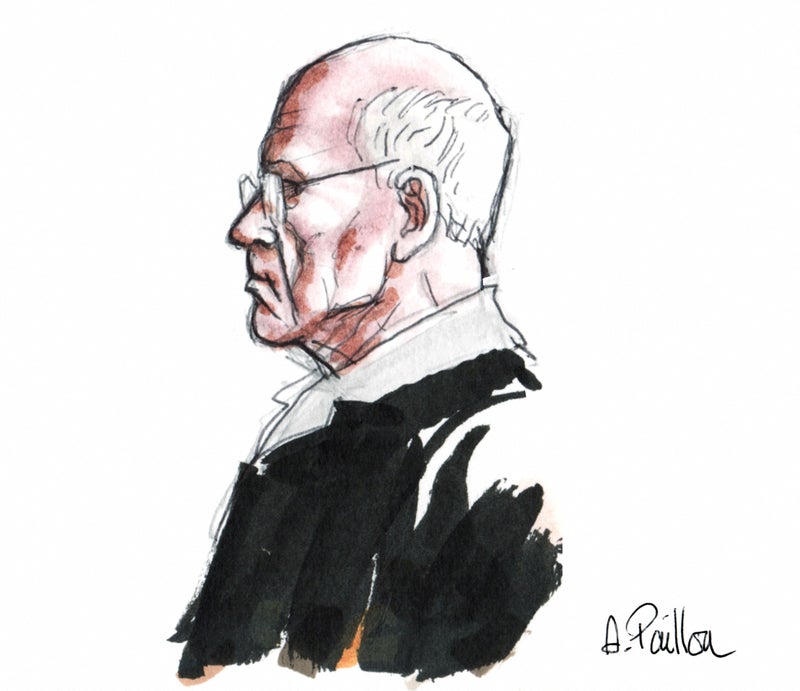Joël Le Scouarnec’s ‘black books’ of handwritten notes in which alleged sexual abuse was recorded are at the heart of case against him. When two gendarmes knocked on her door in 2019, Marie had no idea that she was about to find herself at the dark heart of one of the world’s biggest child abuse cases.
![[Roland and Mauricette Vinet hold a photo of their grandson Mathis.]](https://i.guim.co.uk/img/media/387e23ae21e004884c639c3929c3e2b4af84644a/0_392_5885_3531/master/5885.jpg?width=445&dpr=1&s=none&crop=none)
The French mother of three, now 38, was shocked when the officers told her she had been the victim of Joël Le Scouarnec, a surgeon and an alleged serial paedophile accused of raping and sexually abusing hundreds of children. She recalled asking them: “Was I touched?”.
![[Amélie Lévêque, one of Le Scouarnec’s alleged victims, sitting on a bench]](https://i.guim.co.uk/img/media/5b430f28908b5b2e3ca8eeb9727c93fadba9de78/0_550_4704_2822/master/4704.jpg?width=445&dpr=1&s=none&crop=none)
“No, madame. Raped,” they replied. “I couldn’t think they were talking about me. It’s like cancer, you think it only happens to other people,” she said. “And how could I have forgotten that?”. Faced with the blank in Marie’s memory, the police showed her handwritten notes in Le Scouarnec’s “black books” from 1996, when she was 10 years old and he removed her appendix.
![[Jérôme and Laura Loiseau, the parents of the little girl who Le Scouarnec abused while he was their neighbour]](https://i.guim.co.uk/img/media/ca7bec30c317d40577c224ea68f982ccb0ee2394/0_302_4898_2939/master/4898.jpg?width=445&dpr=1&s=none&crop=none)
“There was my family name, my first name, age, the address of my parents, everything he did and how he felt. It was disgusting. The word ‘raped’ was hard enough, but here were these obscene phrases of what happened.”. Le Scouarnec, now 74, will appear in court on Mondayaccused of the rape or sexual abuse of 299 patients – 158 male and 141 female and the majority under the age of 15 – while they were under anaesthetic or recovering from operations between 1989 and 2014. The average age of his alleged victims was 11.
The surgeon, who entitled one document “my paedophile letters”, denies penetration with his penis. Under French law, rape is an act of sexual penetration by any body part or object. During the four-month trial, local health and hospital authorities will also face difficult questions over why the surgeon, employed in a dozen public and private medical establishments across Brittany and western France, was allowed to continue practising for almost a decade after a conviction for accessing online child abuse images.
“There was an omertà. People knew but said nothing. If there hadn’t been this silence, then he’d have been banned from seeing children in 2004 and there would have been far fewer victims,” Mauricette Vinet, whose grandson Mathis was one of Le Scouarnec’s patients, told the Observer.
Mathis was 10 when he was admitted to hospital with appendicitis in June 2007. In 2019 he also received a visit from the police who told him what they had found in Le Scouarnec’s notebooks. Two years later, aged 24, he died of an overdose. Mauricette and her husband, Roland Vinet, believe the alleged abuse was the deep-rooted cause of their grandson’s chaotic life and drug addiction. “When the police told him what they knew, it was hell for him. The sky fell on his head,” she said. “We tried to support him, but he refused to talk about it. It killed him.”.
The trial comes as France is still reeling from the Mazan hearing last autumn that saw 51 men convicted of raping or sexually assaulting Gisèle Pelicot, including her husband, Dominique, who had drugged her and invited strangers to abuse her. Francesca Satta, the lawyer representing Marie, the Vinet family and other alleged victims, has described Le Scouarnec as “extremely perverse” and a “monster” who used his workplace as a “hunting ground”. Satta believes there could be as many as 400 victims. At least 12 cases were dropped because the allegations were out of time for prosecution.
Satta said the investigation had opened a “Pandora’s box” for those treated by Le Scouarnec, most of whom are today in their 30s and 40s and only now learning about the alleged abuse. It was not they who went to the police, but the police who came to them. “It has caused real distress. Many of the victims were five to 10 years old at the time, many were anaesthetised and incapable of knowing what happened. Most had absolutely no idea. In any case, they were children who wouldn’t have recognised the difference between a medical act and sexual abuse. And he was a doctor. They and their parents trusted him,” Satta said.
The children may not recall what happened to them, but Le Scouarnec’s meticulously handwritten notes will form the basis of the prosecution’s case. Stéphane Kellenberger, the Lorient public prosecutor, said: “At the time, the victims were asleep and sedated. They were not in a position to perceive the facts or to report them. I also note that Mr Le Scouarnec emphasised the stealth of his actions and the strategies he used to conceal them.”.
Amélie Lévêque, 43, only discovered she featured in Le Scouarnec’s notebooks after reading an article in her local newspaper about the surgeon in 2019 and contacting her GP, who checked her medical records and discovered he had removed her appendix in 1991. During a consultation with a psychotherapist, she said the suppressed memories resurfaced. “In a few seconds, I was back to being nine years old again in the recovery room at the clinic. Everything came back: the feelings, the smells, the cold, the heat, the rape. All of it,” Lévêque told La Montagne newspaper.































